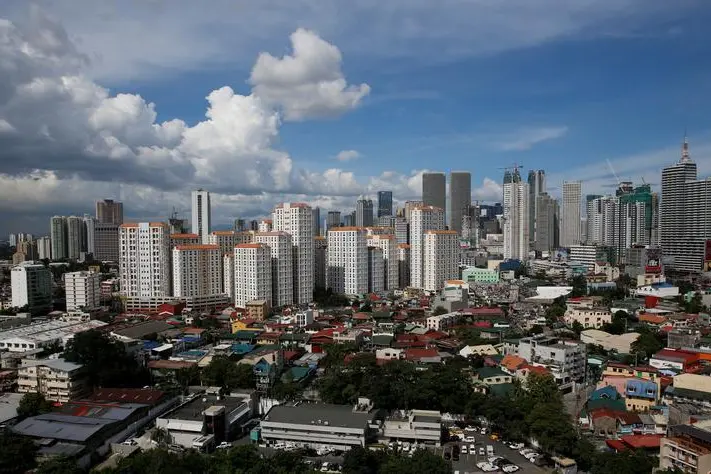PHOTO
Economists believe inflation further eased for the fourth straight month in January, with some convinced that the rise in consumer prices slowed to below three percent for the first time in more than three years.
Ruben Carlo Asuncion, chief economist at Union Bank of the Philippines, said inflation likely eased to 2.2 percent in January from a 22-month low of 3.9 percent in December.
This will be the second straight month that inflation fell within the two to four percent target set by the Bangko Sentral ng Pilipinas (BSP) after breaching the range for 20 consecutive months.
The last time inflation fell below three percent was in October 2020 when it averaged 2.3 percent.
Asuncion said the consumer price index (CPI) would finally ease to four percent this year after breaching the BSP target for two straight years, at six percent in 2023 and 5.8 percent in 2022.
'In our updated CPI trajectory, headline inflation is projected to end 2024 at four percent year-on-year, with a low forecast of 2.3 percent in January and a high of 4.7 percent in July,' he said.
'Because of the sharp drop of inflation from January to March largely due to the base effects, we obtained a full-year average of 3.7 percent. Note that this is a preliminary estimate that has yet to account for the risk of a severe drought due to El Niño in the first half,' the economist added.
Michael Ricafort, chief economist at Rizal Commercial Banking Corp., said headline inflation would have mathematically slowed down to below three percent, at 2.7 percent, primarily due to high base effects after hitting a 14-year peak of 8.7 percent in January 2023.
'Provided (there is) no escalation of geopolitical risks particularly on the Israel-Hamas war and the potential effects on world oil prices, and also provided (there is) no large storm or El Niño drought damage, headline inflation could ease further, well within the two to four percent BSP inflation target, to even below three percent by January-February 2024 and three percent levels for March 2024,' Ricafort said.
ING Bank senior economist Nicholas Mapa sees headline inflation averaging 2.9 percent in January on the back of a favorable base effect.
Mapa said rice inflation would likely remain elevated although most of the other food items could post slower inflation.
'We know that the most effective and quickest way to bring down inflation is to deploy supply-side remedies, and we hope that the fiscal authorities, especially the Department of Agriculture can continue to deploy short term relief as well as implement structural reforms,' Mapa added.
The Dutch financial giant believes inflation will settle within the central bank's two to four percent target for the year barring any supply side shocks and if fiscal authorities continue their push to combat price pressures.
It added that the sustained deceleration of headline could convince the BSP to finally shift back to using its baseline inflation forecast and move away from the risk adjusted inflation forecast.
Mapa said the risk adjusted inflation forecast has progressively been moving lower to 4.2 percent in December from 4.7 percent in October.
China Bank chief economists Domini Velasquez also believes inflation eased to 2.9 percent in January, driven by base effects.
'Month-on-month, we estimate a 0.7 percent increase due to higher prices of agricultural items such as rice, meat, fruits and fish. Additionally, an uptick in domestic pump prices, utilities - electricity and water adjustments of Manila Water and Maynilad, and another tranche of sin taxes contributed to the upward pressure on prices. However, lower prices of vegetables possibly tempered the rise in overall inflation,' she said.
Despite the anticipated slowdown in inflation, Velasquez said the BSP would remain vigilant due to various factors, including the impact of El Niño on rice production, geopolitical risks affecting freight costs and oil prices and domestic risks like transport fare increases due to the PUV modernization.
'As a result, the BSP will likely continue to closely monitor and manage these risks to ensure price stability and maintain an appropriate monetary policy stance,' she said.
Security Bank chief economist Robert Dan Roces said inflation likely continued with its downward trend in January, falling to three percent with a range of 2.8 to 3.2 percent.
'While higher prices for agricultural items like rice, meat, and fruits, along with rising fuel costs, electricity, water rates, and annual sin tax adjustments all contributed to upward pressure, the overall trend remains positive,' Roces said.
While there is potential for a further slowdown in the coming months, the economist said global volatility and domestic factors like adverse weather, wage adjustments and transport costs require close monitoring.
Alvin Arogo, economist at Philippine National Bank, believes inflation stayed above three percent, at 3.2 percent, but slower than 3.9 percent average in December mainly because of favorable base effect.
'For the rest of the year, we have a baseline view that inflation would only settle sustainably within the BSP's target range starting in the fourth quarter. This is because we assume agricultural disruptions due to El Niño and rebound in oil prices as the Middle East conflict remains a significant threat, Arogo said.
Copyright © 2022 PhilSTAR Daily, Inc Provided by SyndiGate Media Inc. (Syndigate.info).





















